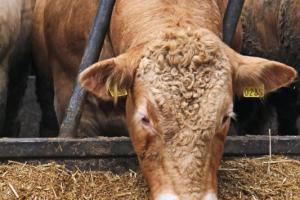Beef finishers: precise nutrition and management on arrival is key to overall performance
Beef finishers recognise that in order to maximise animal performance during the finishing period, animals need to adapt to their new environment and diets as quickly as possible. Cattle coming home from marts or grass that are being housed in sheds for finishing, are subject to several stress factors such as weaning, mixing with new groups, new surroundings as well as changes in their diet. If these factors are not managed correctly animals will not reach their full potential, resulting in a longer finishing period and higher feed costs. The main challenges during this period are bovine respiratory disease (BRD), lameness and stomach upsets or acidosis. To reduce these issues greater emphasis needs to be placed on the nutrition and management during this arrival period in order to improve performance thereby, reducing the number of days animals have to spend on your farm.
How can nutrition improve performance?
Nutritional management on arrival is an important factor in maintaining animal health. This is one of the reasons why animal performance over the finishing period can be poor. Beef finishers should consult with their nutritionist and put a nutritional programme in place which is tailored specifically to new cattle arriving on the farm. Each farm is different and therefore, the length of time animals spend on this arrival or adaptation diet will differ between farms. It can generally take between 20-30 days before animals are on a full finishing diet. The purpose of the adaptation diet is the same for each of these farms and it should focus on:
- Providing good sources of fibre which encourage good chewing activity
- Contain palatable feeds to encourage higher feed intakes
- Include a small amount of the feeds used during the finishing period which will allow the rumen bacteria time to adjust
- Ensure feeds are fresh, not heating and free of moulds which can upset rumen function
- The use of a specific mineral package tailored specially for the adaptation period which contains a high level of SEL-PLEX® and BIOPLEX® trace minerals which improve immune response and ensure cattle settle onto a new diet quicker
- A new technology called ACTIGEN® should also be included in the mineral package. ACTIGEN has shown that through improved animal health, average daily gain and feed conversion ratio have increased (D. Pfenninger, Kansas, U.S.A., 2011).
- The use of YEA-SACC® from Alltech is proven to help improve the rumen environment by increasing rumen pH and therefore, ensuring that the rumen bacteria work more efficiently. Research from Teagasc Grange has shown that the inclusion of YEA-SACC in beef finishing diets can improve performance by over 10%.
How can management affect performance?
The aim here is to minimise stress as much as possible. Purchased animals should be kept separate to the main group until they have settled into their new surroundings. If possible, once the cattle have settled with a group they should remain with that group, mixing cattle encourages fighting and therefore, causes stress. Housing this group in an area with straw bedding and good ventilation can help reduce stress and improve air quality. Keeping groups consistent and small in size, such as 10-15 per group is advised. Allow plenty of resting and feeding space in order to reduce competition and bullying. A good supply of fresh, clean water is vital and there should be at least one drinker for every 10 animals. A good vaccination and animal health programme is also essential, consultation with a veterinary practitioner to give advice on this area is crucial. Not all of the above suggestions are manageable or practical on some farms therefore, it is critical for you to speak with your nutritionist and veterinarian in order to devise a plan that fits with your system. Working to this plan means your cattle will more likely be in better health, adapt to their new diet sooner and subsequently, build up to the final finishing diet quicker. Managing all of these areas efficiently will help to promote the overall health status of the herd therefore, reducing the occurrence of issues such as BRD and lameness, resulting in a higher level of daily live weight gain. Cattle should reach target weights faster, saving you several working days feeding, let alone the additional feed costs.
The technical team at Alltech can offer nutritional support and advice on your diet as well as any issues you may be experiencing.


